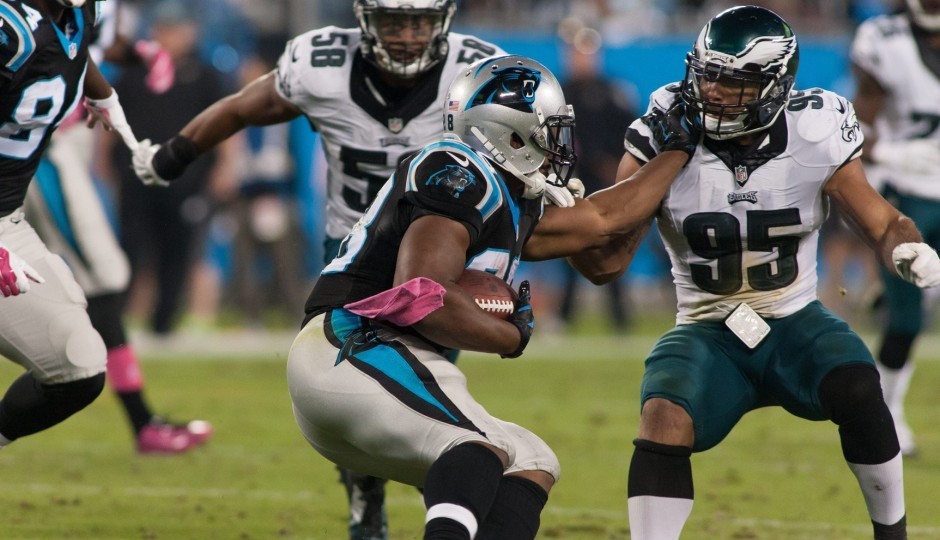All-22: Kendricks, Smith And the Run Defense

Mychal Kendricks. (USA Today Sports)
The Panthers ran the ball 33 times against the Eagles Sunday night, which wasn’t surprising as Carolina entered the game first in the NFL with 33 carries per game. What was surprising was their 204 rushing yards on 6.2 yards per carry.
“We knew going in [they’d run so much],” Chip Kelly said Monday. “I know Jonathan [Stewart] really well; I coached him in college. He ran for 1,700 [yards his junior year]. And I said it before, we knew, number one, he’s tough to bring down and number two, he’s a lot faster than I think people give him credit for. He’s a 250-pound back, but he can pick them up and put them down.”
Before Sunday, the Eagles appeared more than capable of stopping the Panthers’ rushing attack. They ranked first in the NFL in rushing touchdowns allowed (1) and second in opponent yards per carry (3.5).
Carolina, on the other hand, didn’t run the ball that well as they ranked around the league average with 4.1 yards per rush. What killed the Eagles, however, was a 43-yard end around and a 36-yard counter.
“Those two plays were two kind of back breakers for us and uncharacteristic for what we have been like defensively in stopping the run,” Kelly said. “We have not given up a lot of X-runs just because of how we play and everybody swarms to the ball. Our guys have a pretty good understanding of what they are doing, but those specific two runs, I think, really kind of tilted things.”
BIG PLAYS
Mychal Kendricks hadn’t played in three weeks and tackled an opponent in five weeks, so it was reasonable to expect him to be rusty. But that was evident as soon as he stepped on the field in Charlotte, and it cost the Eagles 36 yards on their first defensive series of the game.
After Stewart made Jordan Hicks miss on the Panthers’ first play of the game and gained nine yards, Carolina ran a counter on second down. In addition to Kendricks’ blown assignment, Chris Maragos missed a tackle, which cost the Eagles about 20 yards.
“You looked at that counter run where he took off; I’ve seen [Stewart do] that in person many a time,” Kelly said. “That’s the type of player he is. But you can’t misfit it that way against a really good back like that, or he’s going to make you play.
“We didn’t fit it well, and the backer didn’t get over the top. [He] didn’t post it the way he was supposed to post it.”
Although Kendricks (circled above) was easily fooled, his play recognition seemed to improve as the game progressed.
“Mychal was okay. I think [he was] a little rusty just because of the lack of reps in terms of seeing things, keying it, and diagnosing,” Kelly said. “We just need to get him back into the flow, get more practice time and get more reps so that when he gets out there, he’s [snap of the fingers] bang, bang, bang.”
The Panthers scored two plays later to go up 7-0, and took advantage of a second big run to key another four-play touchdown drive in the next quarter.
Marcus Smith played only three snaps, but on one of those, he lost contain and played a big role in allowing the Panthers’ longest play of the day. After that series, Smith was on the sideline for the rest of the game.
“We should have had contained on the backside,” Kelly said. “The ball should never get back outside of us on that side, the side where the ball went away from originally. We got to kind of contain it and force it back to our help and that was where our biggest break down in that play was.”
Outside of those two snaps, however, the Eagles allowed just four yards per carry. But when the offense failed to take advantage of three takeaways and scored just six points off two red zone trips, the end around and counter proved to be critical missteps.
“Unfortunately, you can’t take those two runs out,” Kelly said. “Those are mistakes that we made.”
PUNT RETURN
Because the run defense allowed so many yards, the punt return unit was also hurt. Coming into the game, special teams seemed like a matchup Philadelphia could take advantage of, particularly with Darren Sproles.
According to Football Outsiders, the Panthers have the second-worst punt unit in the NFL, whereas the Eagles have the third-best punt return unit. Philadelphia ranks second in yards per punt return, is one of six teams to return a punt for a touchdown and has the longest return of the season.
Against Carolina, however, Sproles returned just one punt, in part because the Panthers pinned the ball inside Philadelphia’s 11-yard line three times. When Carolina couldn’t punt the ball from around midfield, the ball traveled only 36 yards and went out of bounds.
“I think that’s what happens with Darren right now,” Kelly said. “You watch the Saints and the Giants, people try to kick away from him, but all of a sudden it changes the kick and we are gaining a lot. [The Saints] tried to kick away from Darren and when they did, that’s what their punter wasn’t real comfortable doing. Therefore, we are gaining yards just because of the kick itself.”